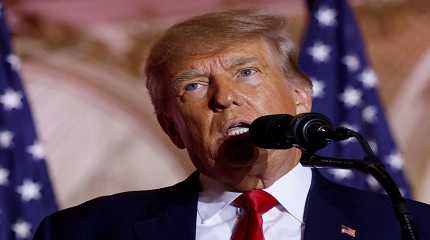
NEW YORK, May 1 (Reuters) - E. Jean Carroll returned to the witness stand in her rape and defamation civil case against Donald Trump, after the judge denied a defense request for a mistrial.
Trump's lawyer Joe Tacopina began cross-examining Carroll for a second day, hoping to show jurors inconsistencies or holes in her claims against the former U.S. president.
Carroll, 79, has accused Trump, 76, of raping her in a Bergdorf Goodman department store dressing room in late 1995 or early 1996, and then undermining her credibility and career by lying about it online.
Her defamation claim concerns an October 2022 post on Trump's Truth Social platform, where Trump called the former Elle magazine advice columnist's case a "complete con job" and "a Hoax and a lie."
The trial in Manhattan federal court began on April 25, and is in its fourth day.
In seeking a mistrial, Tacopina wrote an 18-page letter early on Monday accusing U.S. District Judge Lewis Kaplan of bias against Trump.
Trump's lawyer said the effect of several "unfair and prejudicial" rulings by Kaplan "manifests a deeper leaning towards one party over another," including comments where the judge "openly expresses favoritism."
Tacopina said Kaplan, an appointee of Democratic President Bill Clinton, should have let him question Carroll about why she did not seek security camera footage of the alleged rape.
Trump is leading the Republican field in the 2024 presidential race.
Trump's lawyer also challenged Kaplan's statement that Trump might be "sailing in harm's way" after his son Eric Trump discussed on Twitter how LinkedIn co-founder Reid Hoffman was helping fund Carroll's case.
Kaplan ruled last Wednesday that Trump's lawyers cannot mention Hoffman at the trial, calling it "unfairly prejudicial."
Requests for mistrials are often long shots, though they often form a basis for eventual appeals.
TRUMP NOT ATTENDING TRIAL
A businessman-turned-politician, Trump has not attended Carroll's trial, and on Monday was in Scotland for a short trip to visit his golf courses there and eventually in Ireland.
Because the case is civil, Carroll must establish her claims by a preponderance of the evidence, meaning more likely than not, and need not meet the tougher criminal standard of proof beyond a reasonable doubt.
Carroll had told the six-man, three-women jury last Wednesday that Trump put his fingers into her vagina, which she called "extremely painful, extremely painful," and then inserted his penis.
She also appeared to lose patience after Tacopina asked her why she did not scream, saying Trump "raped me, whether I screamed or not."
Others who may testify for Carroll include two friends with whom she spoke shortly after the alleged rape, two other women who have said Trump assaulted them, and a professor who could help jurors estimate Carroll's damages.
Trump's lawyers have not said publicly whether he plans to testify. They have identified only one other possible defense witness, the psychiatrist Edgar Nace.
Several women have accused Trump of sexual misconduct. He has denied their allegations.




